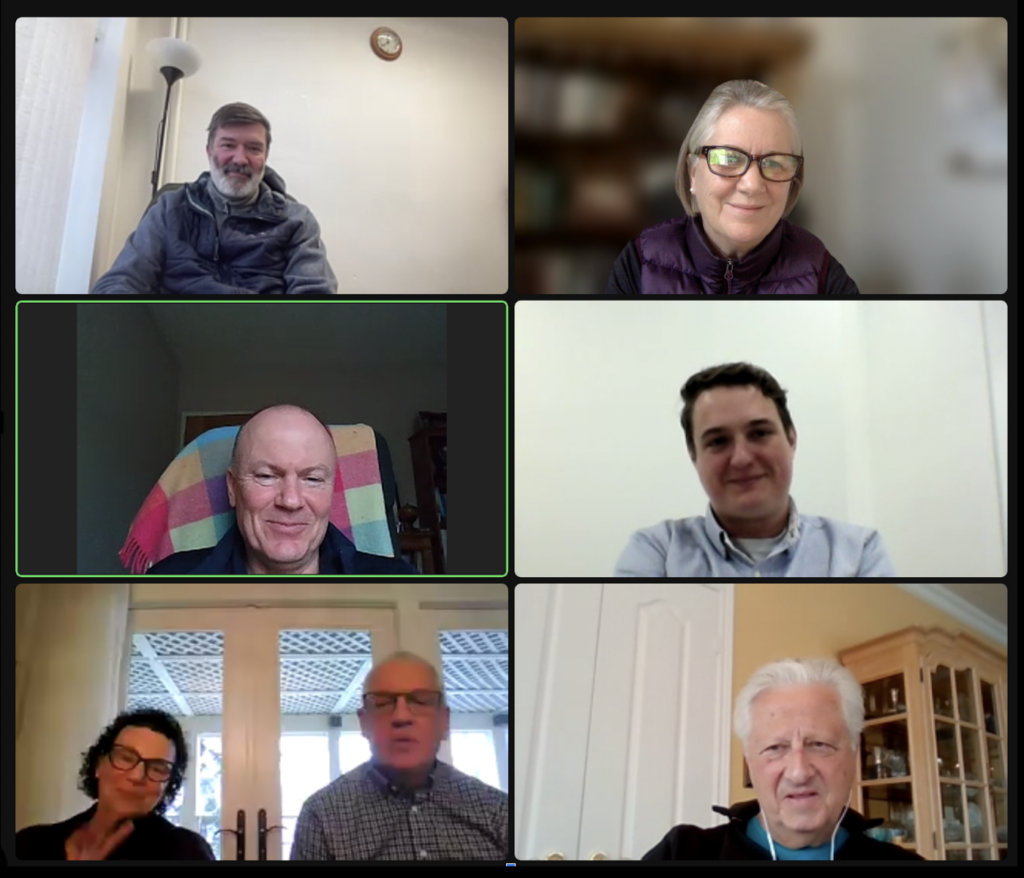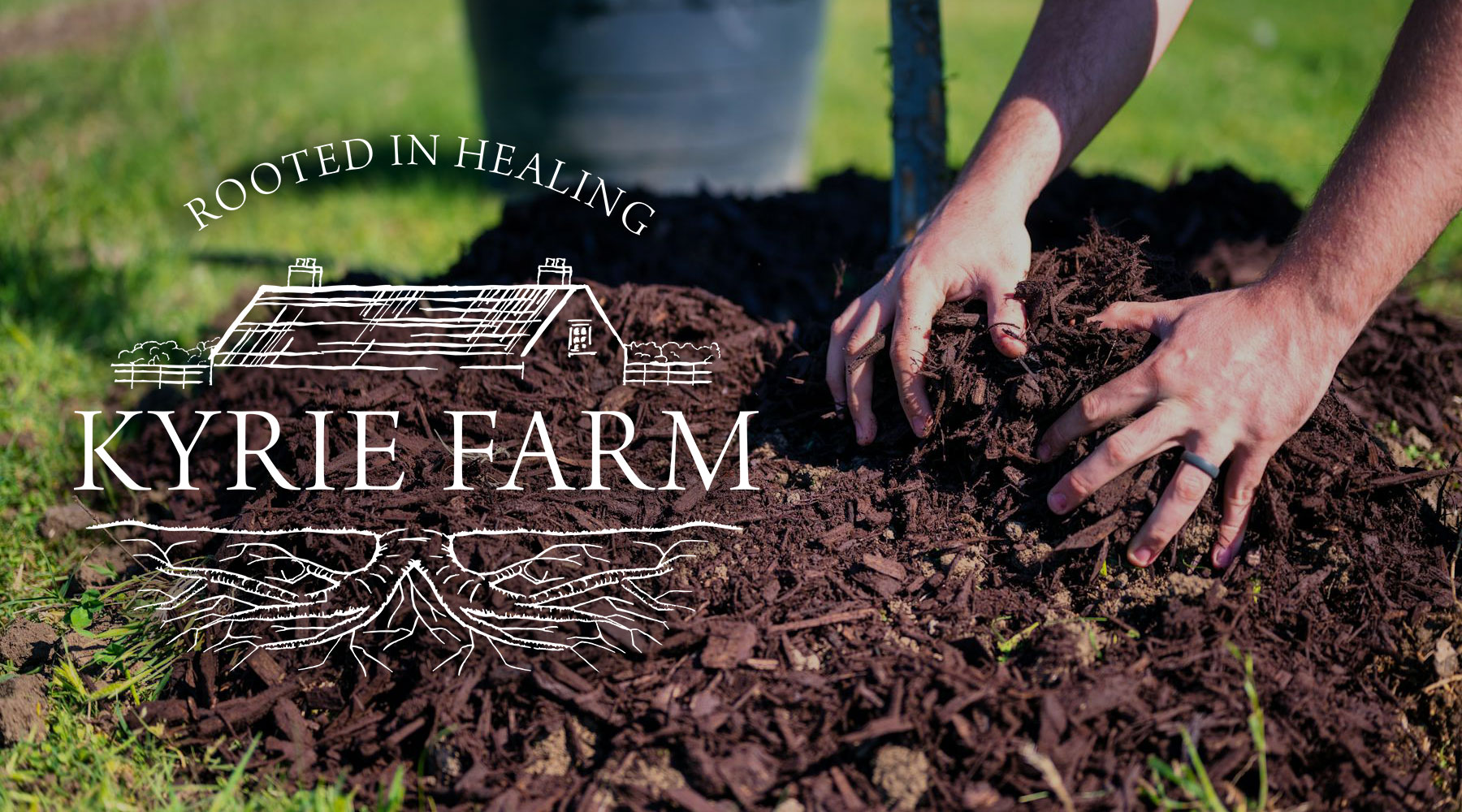
After we exchanged emails, a Zoom call was set up. From the Kyrie Farm were John Mckeon, father of the late Kieran, and Dr. Eoin Galavan, board of directors member. From Eli’s Place were David Cooper, founder and father of the late Eli; Dr. Howard Hamer, board chair; Dr. Joel Shapiro, chair of models committee; Arla Hamer, co-chair of fundraising and me, Kate Kostandoff, chair of communications.
We realized very quickly the ways in which our organizations mirrored each other as we travelled similar paths to establishing therapeutic farms.
Like David and Deborah Cooper, John and his family lost a son to suicide. Like the Coopers, he recognized a gap in care that he believed could be filled for young adults with mental illness. In the years after his son’s death, John’s search led him to visit Gould Farm in Massachusetts, just like the Coopers. Kyrie Farm was incorporated as a nonprofit with the goal of establishing a much-needed treatment option, much like Eli’s Place.
The five key ingredients, so familiar to us — nature, community, therapy, purpose and time — came easily as John explained the vision behind Kyrie Farm. These ingredients echo those articulated for Eli’s Place.

Understatement:
In the Mental Health Sector, Nothing Is Easy
It should be simple. We should each be well on our way to welcoming our first clients, but in the current landscape of publicly funded mental health which relies heavily on private sector funds (whether in support of our hospital system or in filling gaps in care which has become the work of countless charitable organizations), nothing is simple. Officially, Ireland has a hybrid model of healthcare with both public and private healthcare options. Despite our much-lauded public health system, the reality is that Canada has a similar system, albeit unofficial. This is particularly true in the mental health sector.
Ireland is guided by a national mental health plan known as Sharing The Vision. When we asked about the impact of this national plan, Eoin noted that the plan acts as “a signpost, well ahead of program delivery” which at least articulates where Ireland wants to go in terms of mental health treatment. In practice, the fact that Kyrie Farm aligns with goals in the national strategy provides legitimacy and may facilitate access to larger donors as the organization seeks philanthropic benefactors.
The situation in Canada is complicated. It was only in 2022 that the first Minister of Mental Health and Addictions was appointed. Two of our most influential national organizations, the Mental Health Commission of Canada (MHCC) and the Canadian Mental Health Association (CMHA), receive funding from Health Canada to do their work but they also are forced to rely on provincial governments and corporate and private sponsorship. It is through the work of the MHCC that we have a national mental health strategy … at least on paper.
In practice, access to psychotherapy, counseling and specialized treatment is pay for use. While some Canadians have private insurance plans which cover some of the costs, for many, such options are simply out of reach. Organizations such as the Canadian Mental Health Association (CMHA) are lobbying the federal government to consider universal mental health care. As CMHA notes, universal mental health care “covers services that range from keeping people well, and out of crisis, to helping them on their path to recovery. And everything in between.”

Nonprofits to the Rescue
Given these public funding and service gaps, an alternative strategy is necessary in both our countries. It’s the passion and perseverance of parents like the Mckeons and the Coopers who are filling the gaps. Practitioners in the mental health systems in both countries know the stark statistics: the deaths by suicide and the staggeringly high percentage of readmissions to publicly funded psychiatric care in hospitals. The Canadian Institute for Health Information notes that the 30-day readmission rate is 13% in Canada; over time, this readmission rate skyrockets, as many with mental illness rely on emergency health care.
However, being driven by purpose is powerful motivation — particularly when there is a wealth of information about the treatment model we know will make a difference. Assembling a team of dedicated volunteers to drive the founders’ vision was not difficult for either organization. The reality is that therapeutic farms are recognized as effective treatment models and this is particularly true for people with severe and enduring or chronic mental health conditions. Rural, residential care is proven effective care. However, in Ireland as in Canada, the challenge is to acquire the capital to purchase land, build accommodations and hire staff.
Despite the recognition of the rural, residential treatment model by leaders in mental health care and positive outcomes-based data from farms in the United States and the Netherlands it is difficult to gain traction. Despite the growing suicide crisis, and despite the desperate need for care expressed by the steady stream of inquiries we get for admissions, both organizations must push hard to gain forward momentum.
John told us about Sli Eile, an established farm in County Cork and Urtica de Vijfsprong in The Netherlands. He spoke also about helpful discussions he had with people at Cooper Riss in North Carolina. In Australia, Thera Farms is also modelling itself on Gould Farm and is set to be the first therapeutic farm in that country.

Where Are We Now?

Already somewhat ahead of Eli’s Place, a generous single gift allowed Kyrie to purchase a 57-acre property. Located in County Kildare, the farm is 30 minutes from Dublin and comes complete with its own ancient standing stone. In their vision, this stone will anchor the living spaces, therapeutic rooms, administrative offices and dining facility that will eventually be built around the ancient stone.
At Eli’s Place, we are still looking for a property we can purchase or lease. Despite being close several times, we have yet to find our home. And we continue to seek the single game-changing foundational gift that has allowed Kyrie Farm to establish itself on farmland.
While it was empowering to hear about their journey and to learn that they are already selling “veg boxes” filled with volunteer-grown produce from the farm, we want to be there too. Having a place to call home would enable us to get started and secure the transformative donations needed to establish Eli’s Place.

Beyond Validating the Struggles and the Need –
What Did We Learn?
Our meeting uncovered insights and shared challenges. Here are a few discussion points that resonated:
- Both organizations have had to face the stigma and fear surrounding serious mental illness. Our experience with an early property partnership was not unique. Kyrie is currently awaiting a ruling on challenges from neighbours to the national planning board around their intention to serve people with mental illness.
- Both organizations emphasized the need to demonstrate positive outcomes in order to receive public funding.
Each organization had things to share with the other:
- We were excited to learn about innovative design decisions made at Kyrie for client accommodations.
- Understanding the scope of early research partnerships Kyrie has established with Maynooth University was informative.
- We were able to share our literature review from outcomes studies of centres in the U.S. which was appreciated.
Wide-ranging discussions on admissions criteria (inclusion and exclusion) was a helpful exercise in confirming our thinking as well as challenging some of our ideas. The issue of legalized cannabis use in Canada is an added layer of complexity that the Irish do not have. We found common ground in discussions around relational care, which puts patients and families at the centre of the recovery-based approach.
Towards the end of our meeting, John Mckeon remarked that each of us was finding an answer to the existential question so central to mental health both individually and communally: “Why am I here?” We have found the answer in pushing forward to see a much-needed treatment solution be made available to those in need.
Eli’s Place will be a rural, residential treatment program for young adults with serious mental illness. To learn more about our mission and our proven-effective model click here.

Kate Kostandoff | Eli’s Place Board Member
Kate Kostandoff is a member of the Eli’s Place Board. A retired high school teacher, she lives with her family in Port Hope, Ontario.




